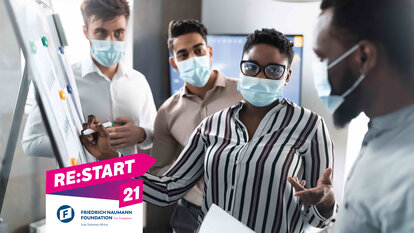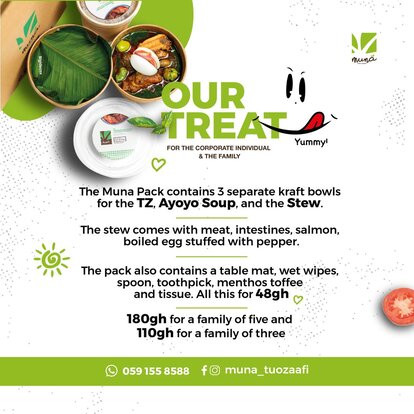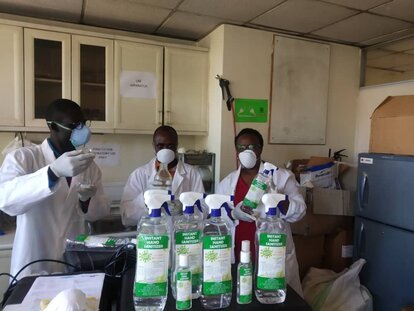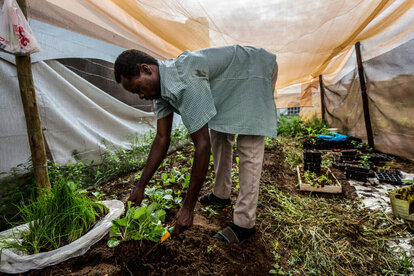
Muna Tuozaafi turns into an online restaurant
Due to COVID-19 restrictions in Ghana, waiters have lost their jobs and restaurants like Muna Tuozaafi have lost many clients. In a submission made by Samuel Afriyie Owusu to the Friedrich Naumann Foundation for Freedom, Samuel speaks about how government stimulus packages for small businesses have helped turn investments into digital infrastructure under the National Digitization Program, which in turn has helped Muna Tuozaafi and other restaurants transform themselves into "online restaurant".
"Promotions, orders and payments are made online and via mobile money. Also, dispatch riders have been employed in place of waiters to deliver foods promptly to clients. Muna Tuozaafi has grown its clients base and sees a lot of prospects in the Digital Restaurant Business," says Samuel.
Muna Tuozaafi menu sample

Environment body makes sanitisers
At the beginning of the first wave in Uganda in 2020, hand sanitisers were not readily available and were very expensive. In a submission made by Jonathan wa Bobi to the Friedrich Naumann Foundation for Freedom, Jonathan shares how the National Environmental Management Authority in Uganda (NEMA) formulated an ethanol based hand sanitiser to be used by NEMA staff.
"At that time it was for only the staff of NEMA, it was never meant for sale but at the start, a sanitizer was too expensive and each pack would go for over Shs80, 000 which is why they had to make a sanitiser for their staff of over 200 people," says Jonathan.
More than 10, 000 in Uganda are now benefiting from this initiative that was made at the start of the pandemic by a government entity in the country.
Expanded hand sanitiser reach in Uganda

Organic vegetable farms founded by homeless men continue to thrive; each one teach one
When Zimbabwean cotton farmer Peter Moyo found himself homeless due to job loss during level 5 lockdown in April last year, he couldn't have anticipated that he would become a formidable business man by running a high quality organic vegetable farming business a year later. He, along with 19 homeless men he met at a homeless shelter, began the Elangeni Green Zone which now supplies a supermarket chain-store, restaurants, and feeds the homeless through soup kitchens in Durban, North Beach.
Moyo happily shares his skills with the group, who have found his input invaluable, along with a Kudakwashe Mufema who also has a diploma in agriculture. "Covid forced us to work with what we have to survive and all the guys now teach others these skills," said Moyo.
One of the co-founders Sandile Mthembu says he learnt the power of cooperation and education. He saw that anything is possible. "Before Covid-19 if you were homeless you were on your own, nobody cared but this time has shown me that people will help if they see you trying and working hard," said Mthembu.
The project was supported by the eThekwini Municipality that supplied the group with seeds, and gardening tools. Their project has branched out into different farms, one in rural uMbumbulu, South Coast and another in South Beach, Durban which is sure to create a ripple effect of skills transfer and empowerment.
The group has high ambitions of teaching more people from previously disadvantaged communities to create and run sustainable vegetable gardens. They also supply other homeless people with produce such as spinach, lettuce, baby carrots and beetroot so they can make an income as street vendors. The pandemic exacerbated food insecurity and poverty, Moyo, Mthembu and the others plan to change that one seed at a time.
Peter Moyo turning the soil in North Beach, Durban.

We ask, what can we learn from the pandemic?
On World Innovation and Creativity Day, 21 April 2021, the Friedrich Naumann Foundation for Freedom in Sub-Saharan Africa invited entrepreneurs, innovators and creatives across the region to submit the most innovative solutions they have come up with that have helped their initiatives, start ups, businesses re-establish or survive during the COVID-19 pandemic.
How digital can and must education be? How can the modernisation of state and economy succeed? What does the African continent of the future look like?
For instance, in the submissions below, many share stories of how digitalisation has helped them advance their education and skills development driven projects forward. Educational resources that can also be accessible for free in marginalised communities are helping thousands of learners who would otherwise be left behind during the pandemic. With this said, there are many things to consider with regards to how digital education can be.
The RE:START21 campaign forms part of the Foundation's 2021 global campaign! Let's talk new ideas!